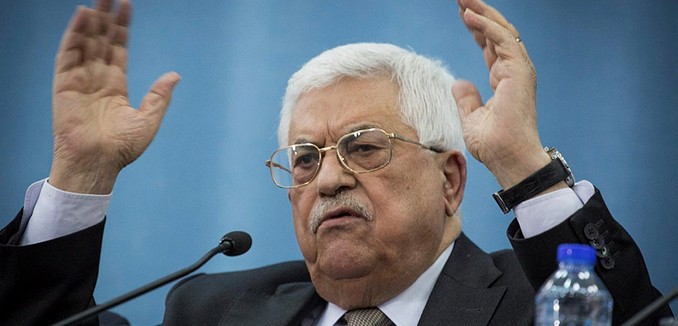Palestinian Authority President Mahmoud Abbas once again turned down an offer to meet with Israeli Prime Minister Benjamin Netanyahu for peace talks, the Palestinian newspaper Al Quds reported on Wednesday. U.S. Secretary of State John Kerry reportedly made the offer to Abbas when the two met in Paris last month.
Abbas said he would only meet with Netanyahu if Israel froze all settlement construction and released political prisoners, Channel 10 reported.
When asked about Kerry’s offer of a Netanyahu-Abbas meeting, a State Department spokesman told The Jerusalem Post on Thursday that he was “not aware of such a proposal.”
Abbas also reportedly turned down a peace initiative proffered by Vice President Joe Biden when the two met in Ramallah in March.
Netanyahu has stated repeatedly that he is willing to have “unconditional, direct, and bilateral negotiations” with Abbas, and announced in May that he was willing “to meet with President Abbas today in Jerusalem. If he’d like, in Ramallah. Right now. Today.” He also expressed his readiness at a joint press conference with French Prime Minister Manuel Valls later that month: “I will sit alone directly with President Abbas in the Élysée Palace, or anywhere else that you choose. Every difficult issue will be on the table: mutual recognition, incitement, borders, refugees and yes, settlements – everything.”
PA Prime Minister Rami Hamdallah rejected the offer. “Time is short,” he said. “Netanyahu is trying to buy time, but this time he will not escape the international community.”
Abbas and Netanyahu have not met to discuss peace in six years, despite Netanyahu’s repeated offers. The Palestinian Authority has sought to circumvent the Oslo process and pursue a unilateral bid for statehood through recognition at the United Nations rather than through a negotiated peace deal. “Peace is not achieved in international UN-style conferences, nor through international diktats that come of meetings of countries around the world sitting to decide our fate,” Netanyahu said to Valls in May. “Peace is achieved through direct negotiations where the Palestinian Authority would face a historic choice: recognize a Jewish state side by side with a demilitarized Palestinian state, or try to eliminate it.”
The Palestinian Authority has rejected a number of peace proposals. In July 2000 at Camp David, former Palestinian leader Yasser Arafat rejected Israeli Prime Minister Ehud Barak’s offer of all of the Gaza Strip and 92 percent of the West Bank, offset by land swaps, along with a capital in eastern Jerusalem. Arafat responded to the offer by launching the Second Intifada. President Bill Clinton made it clear after he left office that he felt Arafat was to blame for the failure at Camp David.
In 2008, Israeli Prime Minister Ehud Olmert presented Abbas with a proposal for a peace agreement, which was also rejected. In an interview a year later, Abbas said he refused the offer because “the gaps were wide.” (Abbas again admitted his rejection of Olmert’s offer last year.) In March 2014, Israel accepted Secretary of State John Kerry’s framework for continued peace negotiations , while Abbas rejected it, and formed a unity government the following month with the terrorist organization Hamas. In September 2015, Netanyahu said that he was willing to restart talks at anytime without preconditions. The chief Palestinian negotiator, Saeb Erekat, responded by calling Netanyahu’s bid a “PR stunt” and rejected the offer.
Netanyahu’s comments came a day after Secretary-General of the Palestinian Presidency Al-Tayeb Abd al-Rahim said in a speech on behalf of Abbas that Palestinians “are a people who love death more than life when it fights for Palestine….Our morale will not be influenced or shaken by anything. We will not grow soft or deviate towards personal interests for the sake of dubious goals such as establishing a state or an emirate in Gaza, or establishing a state with temporary borders in the West Bank.”
[Photo: Hadas Parush / Flash90 ]




